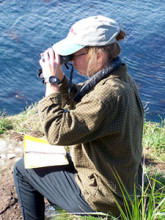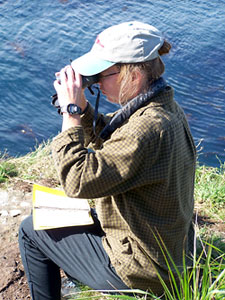Saturday, July 25, 11 a.m. to 3:30 p.m, Lopez Island Public Library
Sunday, July 26, 11 a.m.to 3:30 p.m., Orcas Island Public Library
— from Hannah Spohn —
The Coastal Observation and Seabird Survey Team (COASST) will deliver free training sessions on Lopez Island and San Juan Island on July 25 and on Orcas Island and Shaw Island on July 26. COASST volunteers help make a difference for the environment by collecting data on beach-cast carcasses of marine birds on a monthly basis to establish the baseline pattern of beached bird mortality on North Pacific beaches. Data collected helps address important marine conservation issues and protect marine resources.
Through an interactive, hands-on workshop, trainees will become acquainted with the custom COASST field guide, Beached Birds, and have a chance to try out their newly acquired identification skills on seabird species common to the North Pacific. The COASST training provides volunteers with the tools to monitor for potential changes in the marine environment and promote stewardship of local marine resources.
COASST is a citizen science project of the University of Washington in partnership with state, tribal, and federal agencies, environmental organizations, and community groups. COASST believes citizens of coastal communities are essential scientific partners in monitoring marine ecosystem health. By collaborating with citizens, natural resource management agencies and environmental organizations, COASST works to translate long-term monitoring into effective marine conservation solutions. Currently, more than 800 volunteers survey beaches in Washington, Oregon, California, and Alaska.
On Saturday, July 25, trainings will take place at the Lopez Island Library (2225 Fisherman Bay Road, Lopez) and at the San Juan Island Library (1010 Guard Street, Friday Harbor) from 11:00 a.m.-3:30 p.m. On Sunday, July 26, trainings will take place at the Orcas Island Public Library (500 Rose Street, Eastsound) from 11:00 a.m.-3:30 p.m. and at Shaw Island County Park, in the Day Use Area from 12:00-3:00pm.
Reserve your training spot by calling COASST at 206-221-6893 or by emailing coasst@uw.edu. For more information on COASST: University of Washington, School of Aquatic & Fishery Sciences, Box 355020, Seattle, WA 98195-5020; Phone: 206-221-6893; Website: www.coasst.org.
( from the site: www.coasst.org ) Originally designed to address the need for a rigorous baseline should there be an oil spill, COASST data and the COASST program have been and are being used for an amazing array of science and resource management projects, including:
- genetic ‘typing’ of Western Grebes, a Washington State Candidate for listing as Threatened or Endangered
- baseline monitoring for the introgression of avian influenza
- the local impacts of wind and weather on seabird beaching rates, or how to accurately assess just how many carcasses float ashore each year
- the use of beached bird data to indicate changing coastal conditions—the spectre of climate change?
- the likelihood that native Americans used naturally occurring mass mortality events as regular sources of food
- assessing gillnet bycatch events in Puget Sound, Washington
**If you are reading theOrcasonian for free, thank your fellow islanders. If you would like to support theOrcasonian CLICK HERE to set your modestly-priced, voluntary subscription. Otherwise, no worries; we’re happy to share with you.**









